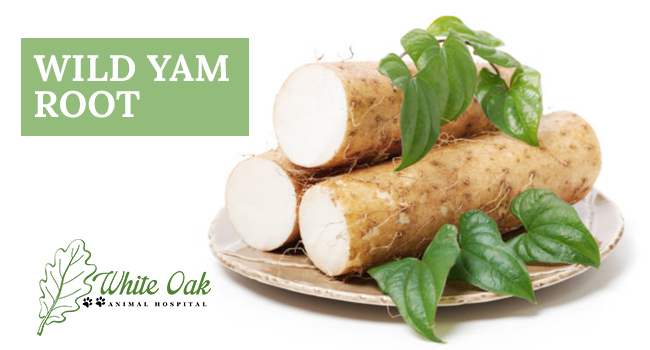
Wild yam root may benefit dogs suffering from incontinence.
What is this herb and what is it used for?
There are more than 600 species of wild yam.
Many of us eat yams, similar to sweet potatoes, on Thanksgiving.
However, most varieties are too bitter to eat, with only about 12 considered edible.
Other common names for the said herb include Colic root, aluka, China root, devil’s bones, Mexican wild yam, and rheumatism root.
Wild yam is native to North and Central America.
However, it also grows in tropical, subtropical and temperate climates.
Wild yam root is a perennial vine, growing in damp woodlands.
It thrives in sunny conditions.
It contains a chemical called diosgenin, which has qualities similar to estrogen.
In labs, researchers harvest some species specifically for this chemical.
Scientists use the roots and rhizome for medicinal purposes.
What Is Wild Yam Root Used For?
Veterinarians often promote wild yam for aging female dogs with urinary incontinence.
Many veterinarians recommend a natural remedy such as wild yam root in conjunction with other natural remedies or pharmaceuticals, varying from case to case.
Because there are many possible causes of urinary incontinence in dogs, it is necessary to have your pet evaluated by a veterinarian.
For example, possible causes of urinary incontinence in dogs include bladder stones, kidney problems, hormone deficiency, old age, or birth defects.
Wild yam root is not an appropriate option for all causes of urinary incontinence in dogs.
Dogs with urinary incontinence caused by a birth defect may benefit from corrective surgery.
The said herb may be a beneficial option for aging dogs with hormone or muscle-related urinary incontinence.
This root has antispasmodic, or smooth muscle relaxing capabilities.
It also boasts anti-inflammatory benefits.
Additionally, this root’s estrogen-like compounds can offer a hormone-normalizing effect.
How Does This Herb Work?
Because wild yam root is antispasmodic and anti-inflammatory, it can help relax the tension on the bladder muscles and prevent unwanted spasms that contribute to dribbled urine.
What Are The Side Effects Of This Herb?
Wild yam root is a mild natural substance.
However, pets have specific dosing requirements.
In large amounts, it may cause an upset stomach or digestive issues.
How To Administer The Herb?
Seeking an easy to administer solution for your pet’s incontinence?
Vet Classics Incontinence Support Chewable Tablets, formulated with wild yam root and bee pollen, provides phytoestrogens and botanicals to support normal muscle tone of the bladder and sphincter muscles.
Vet Classics Incontinence Support Chewable Tablets also contains the following beneficial herbs:
- Wild Yam Root
- Bee Pollen
- Rehmannia
- Angelica Sinensis
- Psoralea
- Glandalai
- Licorice
This combination of herbs work together to strengthen and tighten urinary tissue and muscle and balance estrogen levels.
The supplement is best for female dogs with loss of bladder control.
Dosage is as follows:
- Up to 50 lbs. – 1 Tablet Twice Daily
- 51 to 75 lbs. – 2 Tablets Twice Daily
- Over 75 lbs. – 3 Tablets Twice Daily
Use only as directed by your veterinarian.
Responses to supplements may take up to 4 weeks and may vary by animal.
Learn more about Vet Classics Incontinence Support Chewable Tablets.
Related Posts
-
Are Dental Cleanings for Pets Necessary?
I can usually count on it at least once a week. I follow the…
-
What Every Pet Owner Should Know About Pet Allergies
Whether human or pet, allergies usually prove to be a complicated, and sometimes frustrating, topic.…
-
When Should I Spay or Neuter My Pet?
Should I Spay or Neuter My Pet? For many years, veterinarians recommended clients spay or…
-
Why Reishi Mushroom Extract Boosts Pet Immune Systems
Will Reiki Mushroom Extract Help Your Pet? Did you know dried reishi mushroom extract benefits…









